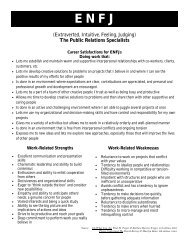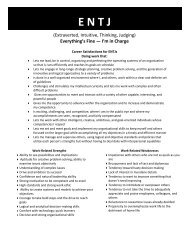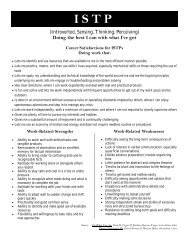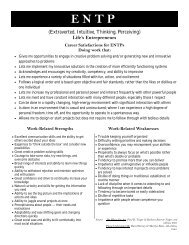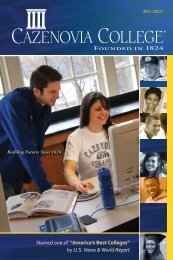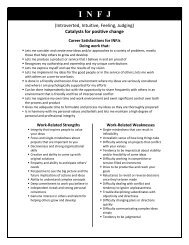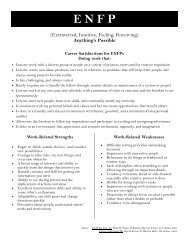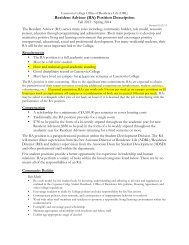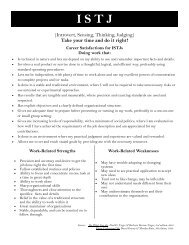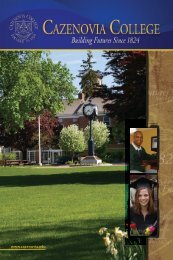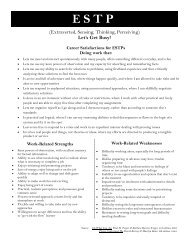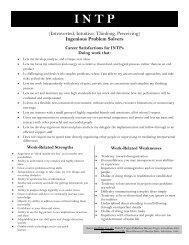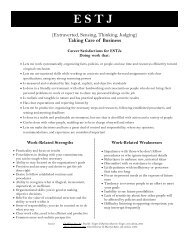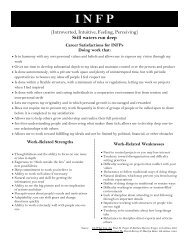of
2013-14 Academic Catalog - Cazenovia College
2013-14 Academic Catalog - Cazenovia College
- No tags were found...
Create successful ePaper yourself
Turn your PDF publications into a flip-book with our unique Google optimized e-Paper software.
CM 410 Advocacy and Public Communication<br />
3 credits (AS)<br />
This course will examine the importance <strong>of</strong> public<br />
communication for social change, participation, the<br />
expression <strong>of</strong> power, and crisis management. Topics<br />
covered will include: the primary methods <strong>of</strong> public<br />
communication; the fundamentals <strong>of</strong> policy creation at<br />
both the local and national level; the role <strong>of</strong> individuals<br />
and groups in promoting solutions to large problems; and<br />
effective advocacy strategies. Specific examples <strong>of</strong><br />
successful advocacy and practical application <strong>of</strong> concepts<br />
will be emphasized throughout the course. (Offered fall<br />
terms) Prerequisites: CM 121 Effective Speaking, EN 201<br />
Academic Writing II<br />
CM 420 Persuasion<br />
3 credits (AS)<br />
Persuasion is everywhere. This course will examine key<br />
theories and concepts about persuasion in a variety <strong>of</strong><br />
contexts including personal interaction, politics,<br />
advertising, and the media. The student will consider<br />
visual images, language, reasoning, and motivation to gain<br />
awareness and understanding about the positive and<br />
negative force <strong>of</strong> persuasive communication. (Offered<br />
alternate spring terms) Prerequisites: CM 110<br />
Introduction to Human Communication and EN 201<br />
Academic Writing II, or permission <strong>of</strong> the instructor<br />
CM 430 Organizational Communication<br />
3 credits (AS)<br />
The pr<strong>of</strong>essional and civic world is a matrix <strong>of</strong><br />
organizations. By understanding the structure, culture and<br />
communication environment <strong>of</strong> various organizations<br />
students can be more effective in both their pr<strong>of</strong>essional<br />
and civic lives. This course will examine a range <strong>of</strong><br />
theories and concepts about management and<br />
communication culture in various organizations. The role<br />
<strong>of</strong> leadership, interpersonal relationships, and ethical<br />
participation in organizations will be important<br />
throughout the course. The course will also introduce<br />
students to the use <strong>of</strong> the communication audit as a<br />
research tool. (Offered alternate fall terms) Prerequisites:<br />
CM 110 Introduction to Human Communication and EN<br />
201 Academic Writing II, or permission <strong>of</strong> the instructor<br />
CM 440 Advanced Topics in Communication<br />
3 credits (AS)<br />
This course will explore key advanced areas in the study<br />
<strong>of</strong> communication and rhetoric. Students will deepen their<br />
understanding <strong>of</strong> core communication concepts and their<br />
application in a range <strong>of</strong> contexts with a particular focus<br />
on power, ethics and social justice. Course material will be<br />
drawn from both historical and current media resources.<br />
(Offered alternate spring terms) Prerequisites: EN 201<br />
Academic Writing II, or permission <strong>of</strong> the instructor<br />
CM 441 Media Management<br />
3 credits (AS)<br />
This course will provide students with the tools needed to<br />
take up leadership roles in media production-based<br />
projects, on campus and elsewhere. While the course will<br />
involve some media production, the focus will be on<br />
honing skills in project and personnel management. The<br />
course will pay particular attention to management<br />
techniques in non-commercial ( third sector’) settings,<br />
including issues such as volunteer<br />
recruitment/management and grant-writing. Prerequisite:<br />
CM 211 Introduction to Broadcasting, or CM 231<br />
Introduction to Journalism; course requires upper-level<br />
standing or consent <strong>of</strong> instructor.<br />
CM 481 Communication Internship<br />
3 credits (AS)<br />
This course is designed to provide upper level students in<br />
the Communication Studies program with the opportunity<br />
to further develop and apply their knowledge in the<br />
pr<strong>of</strong>essional world. Students will participate in a<br />
structured, supervised internship experience at an<br />
appropriate venue related to the communication field.<br />
Opportunity for support and reflection will be provided<br />
through interaction with course faculty and other<br />
participating students. (Offered fall and spring terms)<br />
Prerequisites: CM 110 Introduction to Human<br />
Communication, EN 201 Academic Writing II, and CM<br />
301 Speech and Rhetoric, or permission <strong>of</strong> the instructor<br />
Education<br />
ED 090 Identification and Reporting <strong>of</strong> Child Abuse,<br />
Maltreatment, and Neglect<br />
0 credits (CS)<br />
This training workshop provides information about the<br />
physical and behavioral indicators <strong>of</strong> child abuse and neglect,<br />
as well as the reporting requirements established in the New<br />
York State Social Services Law. This workshop meets the<br />
training requirements <strong>of</strong> Chapter 544 <strong>of</strong> the Laws <strong>of</strong> 1988,<br />
which mandates such training for specified pr<strong>of</strong>essionals.<br />
(Offered fall term)<br />
ED 091 Workshop: Substance Abuse and HIV-AIDS<br />
Education<br />
0 credits (CS)<br />
This six-hour workshop is required for all candidates seeking<br />
teacher certification in New York State. It provides training in<br />
understanding the causes and effects <strong>of</strong> abuses <strong>of</strong> alcohol,<br />
tobacco, and other drugs, and in teaching about HIV and<br />
AIDS. Students will develop instructional plans on these<br />
topics for use with elementary school children. (Offered<br />
spring term)<br />
ED 092 Workshop: School Violence Prevention and<br />
Intervention<br />
0 credits (CS)<br />
This two-hour workshop is required for all teacher candidates<br />
in New York State. Emphasis is on warning signs within a<br />
developmental and social context that relate to violence and<br />
other troubling behaviors in children; statutes, regulations and<br />
policies relating to a safe nonviolent school climate; effective<br />
classroom management techniques and other academic<br />
Academic Catalog | Cazenovia College | www.cazenovia.edu 147



